The Lithuanian parliament amended the criminal code ‘to envisage criminal penalties for supporting, denying or downgrading crimes committed by the Soviet Union or Nazi Germany’ recommending ‘up to two years in prison’. The amendment’s initiator explained that the ‘changes were based on the European Union’s obligation to member-nations to take the necessary measures to ensure penalties for public support for genocide crimes’. BNS report.
News & Views
Seimas Amends Criminal Code to Make Way for New Red-Brown Jailtime Law
Sir Martin Gilbert Writes to State Jewish Museum in Lithuania, Asking for Halt to Campaign Against Kostanian
The following is the text of an email sent by Sir Martin Gilbert to an official of Lithuania’s Jewish state museum in defense of Rachel Kostanian, the internationally acclaimed cofounder and longtime director of the Holocaust section of the state Jewish museum, long known as “The Green House” (it is housed in a green wooden house at Pamenkalnio 12, invisible from the street, and up a steep driveway). She is also an eminent author, creator of exhibits and catalogues, and Holocaust educator who has engated with thousands of loval and foreign visitors to the museum. At Sir Martin’s request, the name of the recipient, and of others mentioned in the letter, have been redacted to maintain confidences and avert unnecessary embarrassments. The alleged “mistake” referred to in the final paragraph refers to a powerful new Holocaust documentary film directed by Saulius Beržinis, which Rachel Kostanian enabled, helped to research and complete, and obtained the funding for from a prominent Litvak family in the United Kingdom. The film was apparently deemed unacceptable for its “excessive truth telling,” as one (non-Jewish) museum worker, speaking off the record, put it with some irony. It will presumably one day find its way to the public square one way or another.
Sir Martin Gilbert’s foreword to Rachel Kostanian’s book Spiritual Resistance in the Vilna Ghetto
Professor Iossel Announces Launch of Litvak Institute in the Canadian Jewish News
The following article by David Lazarus appeared today in the Canadian Jewish News.
MONTREAL — Concordia University professor Mikhail Iossel was cautiously optimistic as he was about to leave for Vilnius, Lithuania, to take the first steps in launching a historically unprecedented undertaking, the Litvak Studies Institute (LSI).
The institute will operate as a permanent, non-profit studies program in Vilnius – known as Vilna to generations of Jews – seeking to preserve and transmit the rich religious, literary, linguistic and cultural legacy that defined Jewish Lithuania and was all but obliterated in the Holocaust, the creative writing professor said in an interview.
But the endeavour, Iossel acknowledged, is being undertaken in a country that – like most of eastern Europe – is experiencing rising nationalistic undercurrents and rumblings that depict Nazism and Stalinism as equal historic evils. Lithuania itself is being presented as a victim of genocide as the government attempts to sanitize its own involvement in the Holocaust.
Klaipeda Court Approves Public Swastikas as Symbol of ‘Lithuania’s Historical Heritage’
While threatening prison sentences for persons holding the belief that the Holocaust is not equal to Soviet crimes, a sudden new trend of ‘liberalism’ appears regarding public displays of swastikas. A court in Klaipeda approved the Nazi symbols on the grounds that they are ‘Lithuania’s historical heritage rather than symbols of Nazi Germany’. The net result it that now the only illegal symbols are the Soviet ones, which are not used by anyone, other than aged anti-Nazi war veterans celebrating the Ninth of May. Hence, it is all part and parcel of the movement legitimizing a pro-fascist view of twentieth century history.
BNS report. Delfi report. Alfa.lt report following the protest of Dr Efraim Zuroff, director of the Simon Wiesenthal Center’s Israel office. JTA report on the court’s decision and Dr Zuroff’s response. More details here. See page on Swastikas.
Lithuanian Court Legalizes Public Swastikas as ‘Historical Heritage’; 2008 Ban on ‘Nazi and Soviet Symbols’ now Excludes… Swastikas
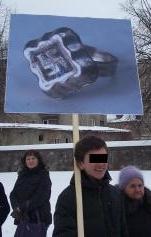 A Lithuanian court in Klaipeda approved the public display of swastikas on the grounds that they are ‘Lithuania’s historical heritage rather than symbols of Nazi Germany’. An ultranationalist ‘expert’ transported from Vilnius was easily able to persuade the court, which did not bother to ask a contrasting view of the Holocaust Survivor community, or the Jewish Community of Lithuania, in a European country with one of the highest proportions of Holocaust genocide on the continent. This sad distinction resulted from massive local participation. Image from 16 Feb Klaipeda demonstration courtesy DMN atKaunodiena.lt.
A Lithuanian court in Klaipeda approved the public display of swastikas on the grounds that they are ‘Lithuania’s historical heritage rather than symbols of Nazi Germany’. An ultranationalist ‘expert’ transported from Vilnius was easily able to persuade the court, which did not bother to ask a contrasting view of the Holocaust Survivor community, or the Jewish Community of Lithuania, in a European country with one of the highest proportions of Holocaust genocide on the continent. This sad distinction resulted from massive local participation. Image from 16 Feb Klaipeda demonstration courtesy DMN atKaunodiena.lt.
BNS report on the court’s 19 May decision here. So much for the parliament’s 2008 ban on ‘Nazi and Soviet symbols’ which only caused pain to aged veterans of the anti-Nazi war effort, and which was ultimately part of the machinations in support of the Double Genocide movement in the European Parliament, in cooperation with the movement’s local power structures.
The United States Embassy has remained silent on the legalization of public swastikas.
Lithuanian Court Approves Display of Swastikas in Public
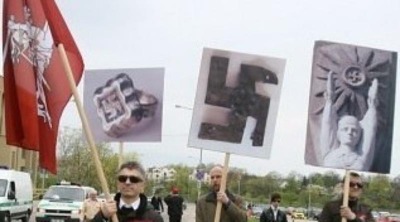 A Lithuanian court in Klaipeda approved the public display of swastikas on the grounds that they are ‘Lithuania’s historical heritage rather than symbols of Nazi Germany’. An ‘expert’ transported from Vilnius was easily able to persuade the court, which did not bother to ask a contrasting view of the Holocaust Survivor community, or the Jewish Community of Lithuania, in a European country with the highest proportion of Holocaust genocide on the continent. This sad distinction resulted from massive local collaboration and actual participation.
A Lithuanian court in Klaipeda approved the public display of swastikas on the grounds that they are ‘Lithuania’s historical heritage rather than symbols of Nazi Germany’. An ‘expert’ transported from Vilnius was easily able to persuade the court, which did not bother to ask a contrasting view of the Holocaust Survivor community, or the Jewish Community of Lithuania, in a European country with the highest proportion of Holocaust genocide on the continent. This sad distinction resulted from massive local collaboration and actual participation.
Media coverage: BNS report on the court’s 19 May decision here. Delfi report. JTA report on the court’s decision and Dr. Efraim Zuroff’s reaction. Photo by J. Markevicius on Delfi.
Neo-Nazis, Protected by Police, flaunt Swasticals near Reval Lietuva Hotel During Baltic Pride Parade
BNS summary here. Video here. The state prosecution service that continues to ‘investigate for war crimes’ Holocaust survivors who joined the anti-Nazi resistance, and passes over neo-Nazi marches in utter silence, tried hard (but failed) to stop the May 8th Baltic Pride Tolerance march in Vilnius.
OUR EYEWITNESS REPORT:
After being refused entry into the actual Baltic Pride marchers’ area, on grounds that we did not have individual permits, we were directed to the plaza between the Reval Lietuva Hotel and the CUP department store where we were told the march’s concluding point could be observed. There, police eagerly directed visitors and sympathisers into an ‘observation area’ just below on a grassy hillside. It soon became evident that while limiting the formal numbers of Baltic Pride participants, the police were shepherding visitors into an area occupied by neo-fascists and bolstering their apparent numbers.
Prosecutors Work Overtime to Nix Baltic Pride Parade in Vilnius
The same state prosecution service that works to send Holocaust Survivors to eternity as suspected war criminals (neither charging nor clearing the innocent persons defamed); and, that is pleased to provide protection and the facade of dignity for neo-Nazi marches (see below at 11 March 2008 and 11 March 2010) spared no effort to ban the 8 May 2010 Baltic Pride parade.
In a typically unbelievable statement worthy of central casting, the head of the Prosecutor General’s office told BNS: ‘I appealed to the court after receipt of information about possible disturbances. The information is confidential, and I would like to refrain from further comment, however, the data we have in our possession suggests there is a possibility of certain disturbances, which we would not want’.
Another classic: ‘Participants of the rally could be targets of violence, we can’t have a police officer for each of them. The event would be protected in its specific location, however, nobody can forecast a crowd’s actions’, he added. Asked whether he had information about a planned riot, Petrauskas said he could not ‘state this specifically’ according to the BNS report. BNS report here.
[8 May 2010 update: While in the end forced by courts to allow the Pride parade (which the capital’s police easily managed), police provided protection and status to the neo-Nazi marchers who for hours flaunted fascist flags near the Reval Lietuva Hotel, flanked by flags of the European Union, Lithuania and various other member states. Eyewitness report and photos here.]
Ruling Party Members Propose Plan to Divert Restitution to Vilna Ghetto ‘Disneyland’ Project, Attacking Local Jewish Community as Illegitimate
The English version of a clandestine plan (dated 21 Nov 2009) to thwart honorable restitution of prewar communal Jewish property to the Jewish Community of Lithuania was leaked to this website today. Incredibly, the plan was proposed by the ruling party in the country’s parliament without informing the government’s long standing negotiating partner — the Jewish Community of Lithuania.
The plot is diabolically simple: to dispense with the communal restitution under negotiation for over a decade (and agreed by every other new-accession EU state), and to ensure that not a single Holocaust Survivor sees any benefit in his or her lifetime. Instead, funds would be poured into ‘morbid tourism’ projects, particularly the white elephant follyesque rebuild of the Great Synagogue (destroyed during and after World War II) as part of the ‘Disneyland Vilna-Ghetto Dead-Jew Tourist Park’ which is anathema to the country’s living Jewish community.
The most offensive part of the document is the passage claiming that the living remnant Jewish survivor community does ‘not have any direct connection with the victims and communities’. This is a diplomatic reformulation of the antisemitic canard that the Jewish community of Lithuania is not legitimate. The claim is part of the wider strategy of pretended friendship toward foreign Jews and prewar Jewry that goes hand in hand with disdain for living local Jews.
Text of the document in English translation. A July 2009 article written in a similar spirit by the former director of the ‘Litvak Foundation‘ [!] claimed that two-thirds of Lithuanian Jews are ‘aliens from the East’. Report here.
Protests outside Norwegian Embassy
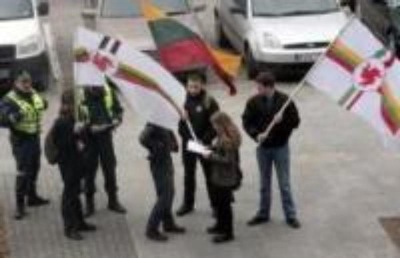
The mass circulation daily Respublika publishes an unflattering photo of the Norwegian ambassador on p. 2 along with its report of the protest delivered to the Norwegian Embassy by a group of participants in the recent neo-Nazi parade. The protesters demonstrated outside the Norwegian embassy in Vilnius on 26 March with flags including the modified swastika flaunted during the parade. Online version of the Respublika report. English translation.
Norway’s Ambassador in Vilnius Stands Up for Human Rights
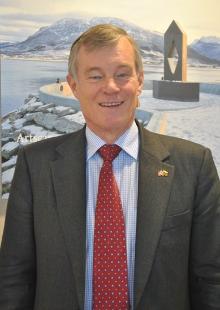 Norway’s ambassador to Lithuania HE Steinar Gil has emerged as a Baltic region champion of human rights, at a time when the Lithuanian government continues its gestures of support for the March 11th neo-Nazi marchers (parallel to Latvian leaders’ stout defense of the March 16th Waffen SS march in Riga). Speaking at a March 19th forum on ‘European and Lithuanian Values’ at the Lithuanian parliament, Ambassador Gil remarked for the record: ‘Every foreigner in Lithuania noticed this march, where the participants were shouting “Lithuania for Lithuanians”. We were shocked.’ The ambassador also pointed out politely that fifty parliamentarians had signed a petition to ban the Baltic Pride gay-rights parade. He asked: How many had spoken up against the nationalist march? He added that every person with respect for herself or himself and for her or his country should condemn this kind of manifestation. Others who have spoken up include Irish ambassador HE Dónal Denham; UK ambassador HE Simon Butt; and Lithuania’s sole Liberal member of the European Parliament, Prof. Leonidas Donskis.
Norway’s ambassador to Lithuania HE Steinar Gil has emerged as a Baltic region champion of human rights, at a time when the Lithuanian government continues its gestures of support for the March 11th neo-Nazi marchers (parallel to Latvian leaders’ stout defense of the March 16th Waffen SS march in Riga). Speaking at a March 19th forum on ‘European and Lithuanian Values’ at the Lithuanian parliament, Ambassador Gil remarked for the record: ‘Every foreigner in Lithuania noticed this march, where the participants were shouting “Lithuania for Lithuanians”. We were shocked.’ The ambassador also pointed out politely that fifty parliamentarians had signed a petition to ban the Baltic Pride gay-rights parade. He asked: How many had spoken up against the nationalist march? He added that every person with respect for herself or himself and for her or his country should condemn this kind of manifestation. Others who have spoken up include Irish ambassador HE Dónal Denham; UK ambassador HE Simon Butt; and Lithuania’s sole Liberal member of the European Parliament, Prof. Leonidas Donskis.
The Prime Minister of Lithuania responds
In response to Ambassador Gil’s concerns, Prime Minister Andrius Kubilius issued a statement that is, in the opinion of this website, extraordinary for an EU/NATO head of government. Declaring his country to be more tolerant than Norway or Denmark, and proclaiming that ‘you couldn’t say it’s either nationalistic or homophobic’, the PM goes on say: ‘There are skinheads and neo-Nazis in every country, and they sometimes take a walk or chant something’. He proceeds to brush away as irrelevant the legalization of the neo-Nazi march via a permit obtained by a member of parliament from his own ruling party. As usual, there is no mention of the continuing prosecutorial defamation campaign against surviving Jewish veterans of the anti-Nazi partisan resistance. BNS report here.
Jewish Community protests March 11 parade
The fragile but proud Jewish Community of Lithuania issued a statement including the feeling that by issuing a permit for the march, the Vilnius city administration used the 20th anniversary of Lithuanian independence to ‘trample on and offend’ the remnant Jewish community in the country. BNS report.
Norway’s ambassador speaks out
HE Steinar Gil publicly criticized the government’s and the elites’ silence and spirit of benign acquiescence following the neo-Nazi march. Speaking at a March 19th forum on ‘European and Lithuanian Values’ Ambassador Gil remarked: ‘Every foreigner in Lithuania noticed this march, where the participants were shouting “Lithuania for Lithuanians”. We were shocked.’
Ambassador Gil also pointed out that 50 parliamentarians had signed a petition to ban the Baltic Pride parade and asked how many Lithuanian parliamentarians and officials have spoken up against the Nationalist march? He added that every person with respect for herself or himself and for her or his country should condemn this kind of manifestation.
Reports on Lithuania Tribune and Delfi.lt (English translation here). Dr Efraim Zuroff’s 22 March statement of support for the ambassador.
Waffen SS March in Riga
Sanctioned by the Municipality of Riga on a route concluding with a ceremony at the city’s Liberty Monument …
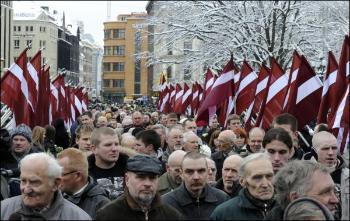
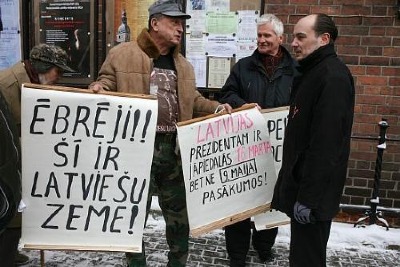
Top: JEWS!! THIS LAND IS FOR LATVIANS!
Bottom: THE LATVIAN PRESIDENT SHOULD PARTICIPATE IN THE EVENTS OF MARCH 16, NOT MAY 9!
Neo-Nazi March again Escorted by Police on Lithuania’s Independence Day in the heart of Vilnius; White Armbands are Back
The fragile but proud Jewish community of Lithuania was again shaken to its core by a Neo-Nazi march in broad daylight through sections of downtown Vilnius on Lithuania’s March 11 Independence Day (see below at March 2008). Once again, the marchers, this time numbering around 500, were diligently escorted by police. Marking the twentieth anniversary of the country’s bold breakaway from Soviet tyranny and its inspiring transition to a modern democracy — a magnificent achievement celebrated by all the country’s communities — it is a cherished day all around. Its tainting by another police-escorted Neo-Nazi parade was all the more painful, especially for aged Holocaust Survivors.
Neo-Nazis March in Vilnius, Sanctioned by Municipality and with Police Escorts
Sanctioned by the Municipality of Vilnius on a route that included Vilna’s destroyed old Jewish cemetery …
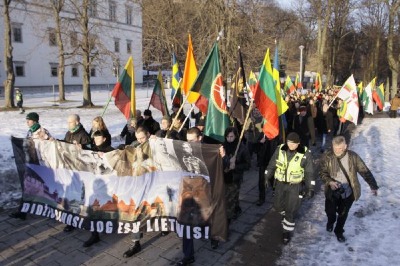
11 March 2010. Elderly Jewish survivors were shaken to the core by this latest Neo-Nazi march in downtown Vilnius on Lithuania’s March 11 Independence Day. The march was sanctioned by the city municipality. The permit was requested by a member of parliament from the governing party. And in a final flourish of inflicted pain, the approved route included the territory of the dismantled Old Vilna Jewish cemetery. All this marred the twentieth anniversary of the country’s bold breakaway from Soviet tyranny and its inspiring transition to a modern democracy, a magnificent achievement celebrated by all the country’s communities. More photos and reports: Balsas.lt. Delfi.lt. Video by Lietuvos rytas.
‘Baltic Times’ Condemns Riga City Council for Trying to Nix March 16th Waffen SS March in the Capital’s Center
The Baltic Times, in the spirit of its increasing pattern of delivering up far-right views dressed up as impartial news coverage, did it again today. The front page banner headline reads ‘Riga Council in Civil Rights Attack’ with the caption to the large front page photo that condemns the city council for trying to block ‘war veterans and others’, as the anonymous authors put it (the article is signed by ‘Staff and wire reports, Riga), from being able to ‘exercise their rights in commemorating wartime duties and efforts’.
There was no mention that these are Waffen SS veterans and that the annual ceremony in the capital’s center is an affront to free Europe and Holocaust victims and survivors.
That an allegedly impartial newspaper would regard a noble attempt to legally block a pro-Nazi march, on the part of elected officials in a European Union country, as a ‘civil rights attack’ in a news headline is shocking. PDF of the article here.
Yitzhak Arad, Survivor, Resistance Fighter, and Major Holocaust Scholar, Wins Book Award in New York City
 Dr Yitzhak Arad won a National Jewish Book Award for his new 700 page volume, The Holocaust in the Soviet Union (University of Nebraska Press).
Dr Yitzhak Arad won a National Jewish Book Award for his new 700 page volume, The Holocaust in the Soviet Union (University of Nebraska Press).
The award was presented at the Center for Jewish History in New York on 9 March. Dr Arad, a Holocaust survivor whose family perished, is a veteran of the heroic anti-Nazi partisan resistance in the forests of Lithuania, and the Israeli War of Independence.
A retired brigadier general and chief education officer of the Israeli Army, he served as director of Yad Vashem in Jerusalem for 21 years. He lives near Tel Aviv.
Uzgavenes Festival again Features Mockery of Jews and Roma
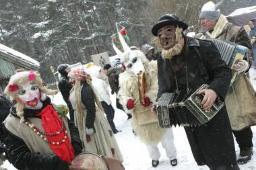 The annual Uzgavenes festival, celebrated throughout Lithuania, again featured costumes and behavior making fun of – and perpetuating the worst stereotypes of – Roma and Jews (‘and monsters’). Roma and Jews comprise two of the country’s smallest and weakest minorities. Most of both communities were murdered during the Holocaust by the Nazis (with massive voluntary participation in the killings by locals). Today, progressive forces continue to live in hope that political, academic, legal, religious and cultural opinion makers in the country will rise to the occasion of explaining the essence, evil and dangers of such rampant racism unconvincingly disguised as the majority’s ‘national ethnographic tradition’. See below at 2008 (→ 6 Feb) for Michael Casper’s Forward report on that year’s event. Photo by Evaldas Butkevičius.
The annual Uzgavenes festival, celebrated throughout Lithuania, again featured costumes and behavior making fun of – and perpetuating the worst stereotypes of – Roma and Jews (‘and monsters’). Roma and Jews comprise two of the country’s smallest and weakest minorities. Most of both communities were murdered during the Holocaust by the Nazis (with massive voluntary participation in the killings by locals). Today, progressive forces continue to live in hope that political, academic, legal, religious and cultural opinion makers in the country will rise to the occasion of explaining the essence, evil and dangers of such rampant racism unconvincingly disguised as the majority’s ‘national ethnographic tradition’. See below at 2008 (→ 6 Feb) for Michael Casper’s Forward report on that year’s event. Photo by Evaldas Butkevičius.
